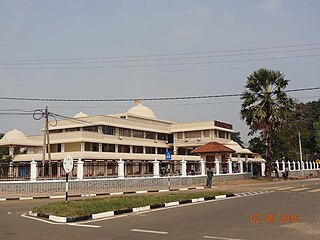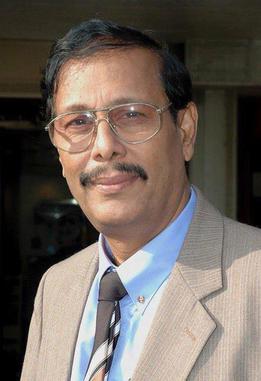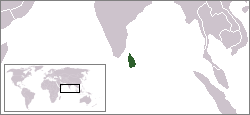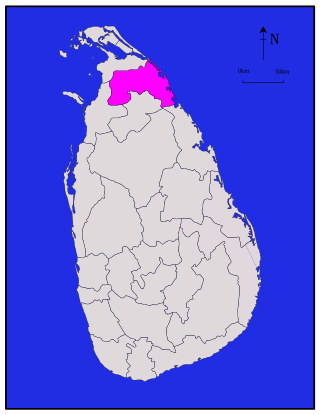Related Research Articles

Sri Lanka was one of the countries struck by the tsunami resulting from the Indian Ocean earthquake on December 26, 2004. On January 3, 2005, Sri Lankan authorities reported 30,000+ confirmed deaths.

The Tamil National Alliance is a political alliance in Sri Lanka that represents the country's Sri Lankan Tamil minority. It was formed in October 2001 by a group of moderate Tamil nationalist parties and former militant groups. The alliance originally supported self-determination in an autonomous state for the island's Tamils. It supported negotiations with the rebel Liberation Tigers of Tamil Eelam (LTTE) to resolve the civil war in Sri Lanka. The TNA was considered a political proxy of the LTTE which selected some of its candidates even though its leadership maintains it never supported the LTTE and merely negotiated with the LTTE just as the Government did.

The Sea Tigers was the naval wing of the Liberation Tigers of Tamil Eelam (LTTE) during the Sri Lankan Civil War. It was founded in 1984. The Sea Tigers had a number of small but effective suicide bomber vessels. During its existence it had gained a reputation as a capable adversary for the Sri Lankan Navy. During the civil war, the Sea Tigers had sunk at least 29 Sri Lankan small inshore patrol boats, 20 Dvora-class fast patrol boats, 3 gunboats, 2 Large surveillance command ships, and one freighter.
Vanni Electoral District is one of the 22 multi-member electoral districts of Sri Lanka created by the 1978 Constitution of Sri Lanka. The district covers the administrative districts of Mannar, Mullaitivu and Vavuniya in the Northern province. The district currently elects 6 of the 225 members of the Sri Lankan Parliament and had 253,058 registered electors in 2014.

Mullaitivu is the main town of Mullaitivu District, situated on the north-eastern coast of Northern Province, Sri Lanka. A largely fishing settlement, the town in the early twentieth century grew as an anchoring harbour of the small sailing vessels transporting goods between Colombo and Jaffna. The town has a District Secretary's office, many other government institutions and schools located in and around the area.

Library damage resulting from the 2004 Indian Ocean earthquake has been reported in six Asian countries. On December 26, the massive 2004 Indian Ocean earthquake struck off the northwest coast of the Indonesian island of Sumatra. The resulting tsunamis killed more than 180,000 people. In addition to the loss of human lives, cultural institutions were destroyed in several Asian nations. Libraries on the Eastern coast of Sri Lanka and the northern province of Aceh on Sumatra were most severely affected by the disaster.
The Battle of Mullaitivu, also known as the First Battle of Mullaitivu and codenamed Operation Unceasing Waves-1, was a battle between the militant Liberation Tigers of Tamil Eelam and the Sri Lankan military during the Sri Lankan Civil War for control of the military base in Mullaitivu in north-eastern Sri Lanka.

Ariyanayagam Chandranehru was a Sri Lankan Tamil merchant seaman, politician and Member of Parliament.

The 1978 Constitution of Sri Lanka provides for the election of members of Parliament from 22 multi-member electoral districts through the proportional representation electoral system.

The Jaffna hospital massacre occurred on October 21 and 22, 1987, during the Sri Lankan Civil War, when troops of the Indian Peace Keeping Force entered the premises of the Jaffna Teaching Hospital in Jaffna, Sri Lanka, an island nation in South Asia, and killed between 60 and 70 patients and staff. The rebel Liberation Tigers of Tamil Eelam, the government of Sri Lanka, and independent observers such as the University Teachers for Human Rights and others have called it a massacre of civilians.
The following lists notable events that took place during 2009 in Sri Lanka.

The Battle of Mullaitivu was a land battle fought between the Sri Lankan Military and the Liberation Tigers of Tamil Eelam (LTTE) for the control of the town of Mullaitivu in the Northern Theatre of Eelam War IV during the Sri Lankan civil war. The town of Mullaitivu was the last stronghold of the LTTE. The government declared on 25 January 2009 that its troops had entered the town and were consolidating their positions.

Mullivaikal Hospital was a makeshift hospital located in the Safe Zone in northern Sri Lanka. An alleged series of shellings and aerial attacks began on 23 April 2009 when the Mullivaikal Hospital was hit by three artillery shells. It continued on 28 and 29 April when the Mullivaikkal Primary Health Center was hit multiple times over two days with six killed and many injured including one medical staffer. On the 29th and the 30th the Mullivaikal Hospital was again hit multiple times with nine more killed and fifteen injured. There were two attacks against the Mullivaikal Hospital on 2 May, one at 9 a.m. and a second at 10.30 a.m. resulting in sixty-eight killed and eighty-seven wounded, including medical staffers. On the morning of 12 May 2009 it was hit by an artillery mortar, killing at least forty-nine patients and injuring more than fifty others. All of these attacks were allegedly by the Sri Lankan Army; however, the Sri Lankan Government denied the allegation stating there is no evidence.

The Sri Lanka Armed Forces is the overall unified military of the Democratic Socialist Republic of Sri Lanka encompassing the Sri Lanka Army, the Sri Lanka Navy, and the Sri Lanka Air Force; they are governed by the Ministry of Defence (MoD). The three services have around 346,700 active personnel; conscription has never been imposed in Sri Lanka. As of 2021 it is the 14th largest military in the world, with 1.46% of the Sri Lankan population actively serving.
War crimes during the final stages of the Sri Lankan civil war are war crimes and crimes against humanity which the Sri Lanka Armed Forces and the Liberation Tigers of Tamil Eelam have been accused of committing during the final months of the Sri Lankan civil war in 2009. The war crimes include attacks on civilians and civilian buildings by both sides; executions of combatants and prisoners by both sides; enforced disappearances by the Sri Lankan military and paramilitary groups backed by them; sexual violence by the Sri Lankan military; the systematic denial of food, medicine, and clean water by the government to civilians trapped in the war zone; child recruitment, hostage taking, use of military equipment in the proximity of civilians and use of forced labor by the Tamil Tigers.

General Anuruddha Leuke Ratwatte, frequently referred to as Anuruddha Ratwatte, was a Sri Lankan politician and a retired army officer. He was a Cabinet Minister and Deputy Minister of Defence.
The Mullivaikkal massacre was the mass killing of tens of thousands of Sri Lankan Tamils in 2009 during the closing stages of the Sri Lankan Civil War, which ended in May 2009 in a tiny strip of land in Mullivaikkal, Mullaitivu.
Varatharajah Thurairajah, born March 3, 1975, is an Eelam Tamil physician and human rights activist. He was noted as one of the official witnesses for the United Nations investigations on war crimes and human rights violations in Sri Lanka. He is a first-hand witness of the events in the "No Fire Zone" in Mullivaikkal, Mullaitivu; and has revealed information to the world about the planned genocide of Tamils in 2009. He is currently engaged in activities related to creating awareness about the issue.
Ponnampalam Memorial hospital is located in Puthukudiyiruppu in Mullaitivu District.It was run by the LTTE in rebel controlled areas. It was bombed by the Sri Lankan airforce and the hospital was destroyed. Human Rights Watch accused the Sri Lankan military of shelling hospitals in the Safe Zone indiscriminately with artillery and attacking them aerially beginning with the Mullaitivu General Hospital in December 2008 and including at least eight other hospitals. Human Rights Watch stated that these attacks constitute war crimes. They've also said that the hospitals are clearly marked.Report of the Secretary-General's Panel of Experts on Accountability in Sri Lanka found that the allegations that the Sri Lankan military shelled hospitals were credible.Gotabaya Rajapakse claimed that "No hospital should operate outside the Safety Zone...everything beyond the safety is a legitimate target," and stating the attack was legitimate. US Secretary of State Hillary Clinton and British Foreign Secretary David Miliband jointly called on the warring parties in the island of Sri Lanka to "not to fire out of or into" the safe zone and in the "vicinity of Puthukkudiyiruppu (PTK) hospital or any other medical structure".
References
- ↑ "Under Line Ministry Beds 2010" (PDF). Ministry of Health, Sri Lanka.
- ↑ Parliamentary Debates. Vol. 40. Sri Lanka. 1961. p. 182.
{{cite book}}: CS1 maint: location missing publisher (link) - ↑ "Supporting Mullaitivu hospital". International Committee of the Red Cross. 14 February 2005. Retrieved 20 October 2019.
- ↑ "Sri Lanka: Repeated Shelling of Hospitals Evidence of War Crimes". Human Rights Watch. 8 May 2009. Retrieved 20 October 2019.
- ↑ "Valipunam hospital (displaced Mullaitivu Hospital) – Still Counting the Dead". stillcountingthedead.com. 27 June 2012. Archived from the original on 3 March 2016. Retrieved 20 October 2019.
- ↑ Balachandran, P. K. (16 May 2012). "Massive aid for Mullaitivu Hospital". The New Indian Express. Retrieved 20 October 2019.